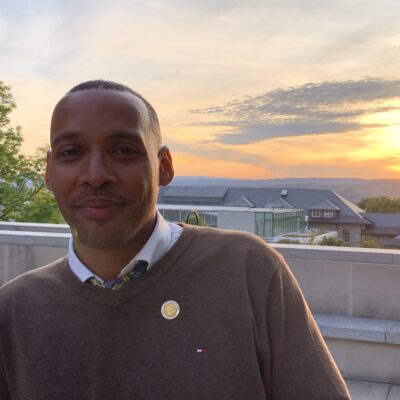Student Spotlight: Elias Beltrán

June 20, 2023
Elias Beltrán is a doctoral candidate in comparative literature from the Bronx, New York. He earned a bachelor’s degree in literature and the humanities from Bard College and now studies Hispanophone Caribbean literature, art, culture, and history under the guidance of Natalie Melas at Cornell.
What is your area of research and why is it important?
My area of research is Hispanophone Caribbean literature, art, culture, and history, all of which I approach through the lenses of postcolonialism, liberalism, time, trauma, memory, and nostalgia. Junot Diaz called the Dominican Republic “Ground Zero” for how the conquest of the Americas unfolded, and so much of our current predicaments with race, with contested history, and with the erasure of people emanate from that region. When I hear how we should teach a certain “brand” of American history, my heart gets a dull ache. It’s not just the propensity to sanitize history, but it’s the persistence on erasing people, erasing culture, absolving culpability and guilt. But, for me, the problem with doing that goes beyond the violence this entails. It also means that the colonial systems which emerged and which are still in place in such a destructive way to so many people not only remain in place, but no one is responsible for dismantling them.
This is not only intellectually dishonest, it is morally so as well.
What are the larger implications of this research?
My research centers on uncovering the presence and cultural contributions of the Chinese diaspora in the Hispanophone Caribbean. Given the current predicament of minorities’ continued fight against historical erasure, the fights for visibility and inclusion, as well as the immediate predicament of the postcolonial condition, decolonization, and the constant struggle for history, my research remains highly important as it confronts all of these issues in the geographic context of my research.
My former work as a graffiti artist has helped me hone in on obscured cultural contributions such as those to Puerto Rican “street art” by artists like as DALEast. This is also important because when Pablo Picasso was challenged that his Portrait of Gertrude Stein did not, in fact, look like Stein, his response was that “it will.” His reductionist response was prophetic. So, when artists such as Puerto Rico’s Calle 13 and El Gran Combo reduce the Chinese diaspora to racialized mimicry and cheap stereotypes, the fight against having this diaspora’s being remembered through those reductions is real—self-representation and recovered histories become incumbent.
What does it mean to you to be a Dean’s Scholar?
Being a Dean’s Scholar is a singular recognition of my ability as a member of an underserved and under-resourced community. It attests to the fact that, with an even playing field, students of similar backgrounds to mine can make significant contributions to—and reshape—the very scholarship that has not only been withheld from us, but also weaponized (intentionally, as well as misguidedly).
What are your hobbies or interests outside of your research or scholarship?
Outside of research and scholarship, I am reclaiming my love and practice of art. I also still love playing baseball, softball, basketball, and taking long hikes with my wife and Buster, our one-year-old Boxer-Ridgeback mix.
Why did you choose Cornell to pursue your degree?
When it came down to deciding between NYU and Cornell, it was the sense of community Cornell offered that won me over. Cornell seemed not only interested in my potential for research and meaningful scholarship, but also in my person as a member of a larger academic community. Both Cornell and Ithaca have proven to offer precisely that.
Moreover, the diverse body of academics here have not only challenged me to expand my thinking, but also allowed me to pursue other peripheral interests and uncover myriad ways in which my life experiences and scholarship intersect. For instance, through some of my theoretical work on temporality, Game of Thrones became an aperture for the discursive possibilities with theories of time, as well as the resonances of futurity on memory. Critical engagement with poetry and hip hop have led to dialoguing the works of the Wu Tang Clan and Gwendolyn Brooks as critiques against the emerging Christian Nationalist sentiment rising in our contemporary political environment. I have likewise been able to put the works of hip hop artist Lupe Fiasco in conversation with the poetry of Derek Walcott and Nancy Morejón and the critical eye of Edouard Glissant. Given these diverse interests and the amazing body of scholars with such richly diverse backgrounds here, comparative literature at Cornell has definitely been a great choice and an excellent fit for me.
